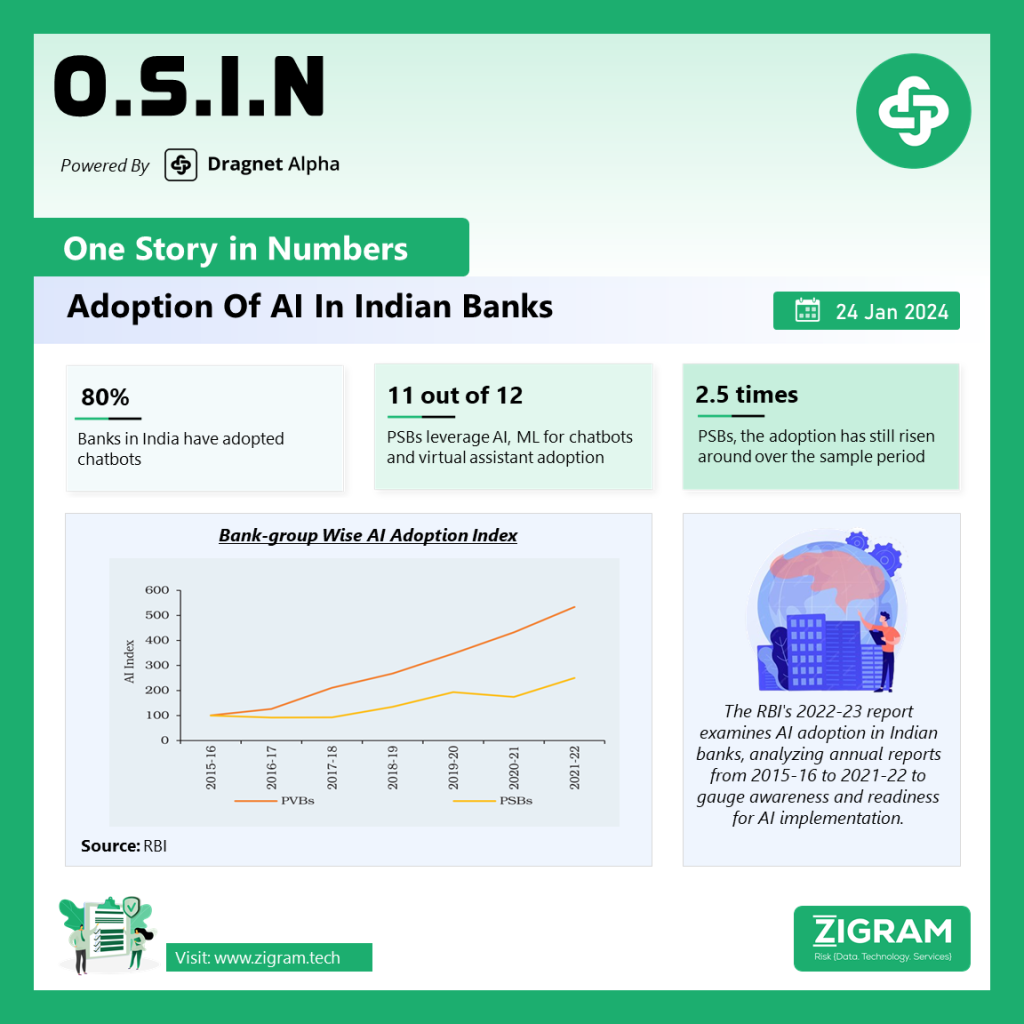Published Date:
The Reserve Bank of India’s (RBI) recently released report for 2022-23 provides a comprehensive analysis of the trends and progress in the banking sector in India, with a specific focus on the adoption of Artificial Intelligence (AI). The study aims to evaluate the awareness and readiness of Indian banks to incorporate AI by examining their annual reports from 2015-16 to 2021-22.
The analytical approach employed by the RBI involves textual analysis, utilizing named entity recognition techniques, and matching specific keywords related to AI. The study integrates widely recognized AI and Machine Learning (ML) dictionaries and glossaries from sources such as Google Vertex AI, Google Developers, IBM, NHS AI Lab, and the Council of Europe. Additionally, insights from Large Language Models like ChatGPT and Bard contribute to the comprehensive analysis.
The findings reveal a significant uptake of AI in the banking sector, with over 78.8% of the analyzed scheduled commercial banks adopting AI technologies. Notably, 11 out of 12 public sector banks (PSBs) had implemented some form of chatbot and virtual assistant using AI and ML technologies by the end of June 2023.
The report highlights the transformative potential of AI in various aspects of banking, non-banking, and financial markets. The evolution of AI technologies, coupled with advances in computing power and data availability, has led to breakthroughs in areas such as asset management, algorithmic trading, credit underwriting, and blockchain-based financial services. AI is anticipated to revolutionize financial services by creating new products, opening up markets, and fostering innovation.
The study emphasizes the widespread adoption and heavy use of AI tools in areas like fraud detection, optimization of IT operations, and digital marketing. Banks stand to benefit from these applications through more efficient resource utilization, ultimately enhancing the customer experience. Machine learning techniques, specifically in real-time analysis of customer transactions, contribute to improved risk management strategies, strengthening the overall resilience of the banking sector.
The report also notes that one-third of respondent financial services companies globally expect 51 to 75% of their workload to be supported by AI technologies within five years. Banking and financial services are at the forefront of AI adoption on a global scale.
The textual analysis of Indian banks’ annual reports reveals a substantial increase in the usage of AI-related keywords, particularly in Private Sector Banks (PVBs). While Public Sector Banks (PSBs) show relatively muted adoption, it has still increased around 2.5 times over the analyzed period. A word cloud analysis indicates a strong focus on automation, driven by the objective of efficiency gains and bolstering fraud detection and other predictive analytics.
The report concludes with insights into the usage of relatively newer technologies such as Robotic Process Automation (RPA), the Internet of Things (IoT), and Natural Language Processing (NLP). The awareness and potential adoption of these technologies are highlighted, showcasing the evolving landscape of technological integration in the Indian banking sector. Additionally, the prominence of chatbots, especially post-mergers in PSBs, demonstrates a strategic approach to enhancing customer services and engagement. The broader service industry is adopting AI-driven chatbots for efficient and natural language-based interactions with users.
RBI’s report underscores the transformative impact of AI on the Indian banking sector, indicating a growing awareness and adoption of AI technologies to drive innovation and efficiency across various banking operations.
- #AIinBanking
- #RBIReport
- #BankingTrends
- #DigitalTransformation
- #MLinFinance
- #ChatbotsInBanking
- #FinancialInnovation
- #TechAdoption
- #BankingRevolution
- #FutureOfFinance

